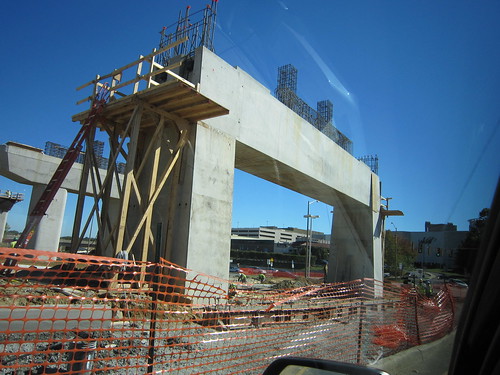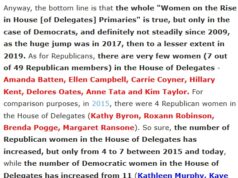 There have been so many horrendous pieces of legislation put forward by Virginia Teapublicans this year, it’s hard to keep track. Earlier this week, yet another item in the Tea Party agenda (also something that was a “major priority” of Ken Kookinelli) passed the State Senate — SJ3, calling for a constitutional amendment which “provides that private property can be taken or damaged only for a public use, only with just compensation to the owner, and only so much taken as is necessary for the public use. The amendment adds that “[j]ust compensation must equal or exceed the value of the property taken, lost profits and lost access, and damages to the residue caused by the taking.”
There have been so many horrendous pieces of legislation put forward by Virginia Teapublicans this year, it’s hard to keep track. Earlier this week, yet another item in the Tea Party agenda (also something that was a “major priority” of Ken Kookinelli) passed the State Senate — SJ3, calling for a constitutional amendment which “provides that private property can be taken or damaged only for a public use, only with just compensation to the owner, and only so much taken as is necessary for the public use. The amendment adds that “[j]ust compensation must equal or exceed the value of the property taken, lost profits and lost access, and damages to the residue caused by the taking.”
The vote on this one was 23-17 in the Senate and 80-18 in the House. Those votes included several Democrats, including Senators Deeds, Edwards, Northam, Petersen and Puckett. Opposition to this bill came mostly, although not exclusively, from Democrats. I interviewed several Democratic lawmakers, as well as local officials, and got an earful. Here are a few highlights.
1. Del. Scott Surovell, who voted “nay,” argues that amending the constitution of Virginia is “unnecessary,” that this issue was already addressed by statute in 2007, and that this amendment will “run up the cost of road and transit around the entire state by billions of dollars.” Surovell explains that “now we [will] have to pay for lost access and profits for every business on an improvement; imagine what that would mean [for] the Silver Line and VA-7.” Finally, Surovell adds that the existing language in the Virginia constitution “was written by George Mason” and “has worked fine,” that there’s no reason to change it in this way.
2. Sen. Chap Petersen, who voted “aye,” argues that “Eminent Domain is an inherent right of orderly government,” and that “it is entirely appropriate to protect small businesses which are effectively shut down by government takings.” Petersen adds, “Ironically, my concern is that the follow-up legislation, SB 437, which defines ‘lost profits’ is so limiting that the great majority of small businesses will not be able to recover in that current form. Therefore, I personally don’t believe the scope of the amendment is anywhere near what either the proponents or opponents have projected.” “Regardless,” Petersen concludes, “this issue will go to the voters to decide…”
3. Sen. Ralph Northam, who voted “aye,” makes the case (through his legislative aide) that this was about protecting “the agriculture community,” in places like “Northampton and Accomack Counties on the Eastern Shore, as well as Mathews County on the Middle Peninsula.” According to Northam’s LA:
All of these localities are very rural and have a lot of farm and forestry activity. Especially with the pressure from developers that these rural communities have experienced (mostly before the housing bubble burst, but some since), people genuinely feel that their way of life is threatened. It was a tough call for him given the challenges facing cities like Norfolk, which he also represents, but he will continue working with them to provide tools for fighting urban blight. I will add in his defense that he voted to send the related ‘lost profits and access’ bill (SB437) back to Finance, as he believes there are some legitimate concerns with the fiscal impacts that may ensue.
4. Arlington County Board member Jay Fisette is obviously not in Richmond, but he strongly opposes this amendment. According to Fisette:
This is a travesty and will prove to be far more costly and cumbersome for the state and for local governments than legislators understand. The McDonnell administration suggested an annual cost to VDOT, for just the “lost profits & access” alone at about $40M. I think that is a very low estimate, that doesn’t take into account the increase in staff time and legal costs to process these situations. I believe this is the most far-reaching eminent domain policy in the U.S., and will be a gold mine for attorneys with all settlements paid for by the taxpayers of Virginia.
This was a top priority for the VA Association of Counties and VA Municipal League.
Arlington has not yet done a specific estimate of increased future costs, but we will have to do one.
I also chatted with a smart, progressive friend of mine who noted that this “crap” is being pushed by ALEC and the Tea Party. He also provided an interesting example of how this could work:
Say you own a building and the tenant pays you $1,000 per month for the lease and the land is condemned for a rail project. The law says you would get the value of the land plus the lease payments for three years so a net profit. They want you to be able to get that $12,000 per year for the expected life expectancy of people. Meaning if I owned that building and I’m expected to live for another for another 50 years you’ve increased the total payout by over $600,000
Does that seem crazy to you? It sure does to me. Which is why I where I come down on this is strongly with Scott Surovell, Jay Fisette, and my environmentalist friend. Given that this “problem” was already fixed by statute back in 2007, there’s certainly no reason to amend Virginia’s constitution with this. Even worse, the “lost access and profits” clause will crank up the cost of important, necessary infrastructure projects by millions or even billions of dollars. Finally, as Jay Fisette points out, this will harm localities and also “be a gold mine for attorneys with all settlements paid for by the taxpayers of Virginia.” Why on earth would we want to do any of that? I strongly urge the people of Virginia to reject this unnecessary, costly, ideologically-motivated Tea Party amendment come November.












